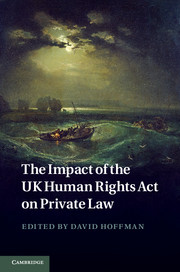Book contents
- Frontmatter
- Contents
- Contributors
- Foreword
- Preface
- Acknowledgements
- Table of cases
- Table of statutes
- Table of statutory instruments
- Table of European Union Legislation
- Abbreviations
- 1 Introduction
- 2 Mapping horizontal effect
- 3 Public authorities: what is a hybrid public authority under the HRA?
- 4 Statute law: interpretation and declarations of incompatibility
- 5 Precedent
- 6 Tort design and human rights thinking
- 7 Privacy: the development of breach of confidence – the clearest case of horizontal effect?
- 8 Nuisance
- 9 Defamation
- 10 Discrimination law
- 11 Damages: private law and the HRA – never the twain shall meet?
- 12 Property and housing
- 13 Commercial law
- 14 Restitution
- 15 Insolvency
- 16 Employment law
- 17 Civil procedure: Article 6 – a welcome boost to the development of English procedural law?
- 18 Conclusions
- Index
- References
12 - Property and housing
Published online by Cambridge University Press: 05 November 2011
- Frontmatter
- Contents
- Contributors
- Foreword
- Preface
- Acknowledgements
- Table of cases
- Table of statutes
- Table of statutory instruments
- Table of European Union Legislation
- Abbreviations
- 1 Introduction
- 2 Mapping horizontal effect
- 3 Public authorities: what is a hybrid public authority under the HRA?
- 4 Statute law: interpretation and declarations of incompatibility
- 5 Precedent
- 6 Tort design and human rights thinking
- 7 Privacy: the development of breach of confidence – the clearest case of horizontal effect?
- 8 Nuisance
- 9 Defamation
- 10 Discrimination law
- 11 Damages: private law and the HRA – never the twain shall meet?
- 12 Property and housing
- 13 Commercial law
- 14 Restitution
- 15 Insolvency
- 16 Employment law
- 17 Civil procedure: Article 6 – a welcome boost to the development of English procedural law?
- 18 Conclusions
- Index
- References
Summary
In 1828 the Real Property Commission was tasked with making ‘diligent and full inquiry’ into the English law of property. Just one year later, the Commissioners reached the bold conclusion that property law, ‘except in a few comparatively unimportant particulars, appears to come almost as near to perfection as can be expected in any human institutions’. One can only conjecture, but, had the Commissioners been asked whether property law respects the values that are today enshrined in the Convention and the HRA, their answer would likely have been that, as a near-faultless human institution, it does.
It is the aim of this chapter to ascertain the effect of the HRA on property and housing law: is the domestic property system a bastion so perfectly formed that it is fortified against attacks on human rights grounds; or does it have weaknesses that expose it to such challenges? From the point of view of the property lawyer, the issue is whether property law needs to be relearned and property tomes rewritten on account of human rights, with the possible effect that the rules of property law become less stable and predictable. From a citizen's perspective, the importance lies in whether the current property rules determine their rights conclusively, or whether the HRA provides them with any greater or lesser proprietary entitlement against other citizens.
- Type
- Chapter
- Information
- The Impact of the UK Human Rights Act on Private Law , pp. 249 - 299Publisher: Cambridge University PressPrint publication year: 2011
References
- 1
- Cited by



